Hi,
Through time I've gathered some secondhand tools for wheelbuilding. The latest is a Hozan C-737 spoke tension meter. I'm planning to build some wheels with it in the coming months. Are there any retrobikers here that have worked with the Hozan or similar meters and can say anything about recalibration?
Thanks,
Remko
Through time I've gathered some secondhand tools for wheelbuilding. The latest is a Hozan C-737 spoke tension meter. I'm planning to build some wheels with it in the coming months. Are there any retrobikers here that have worked with the Hozan or similar meters and can say anything about recalibration?
Thanks,
Remko
